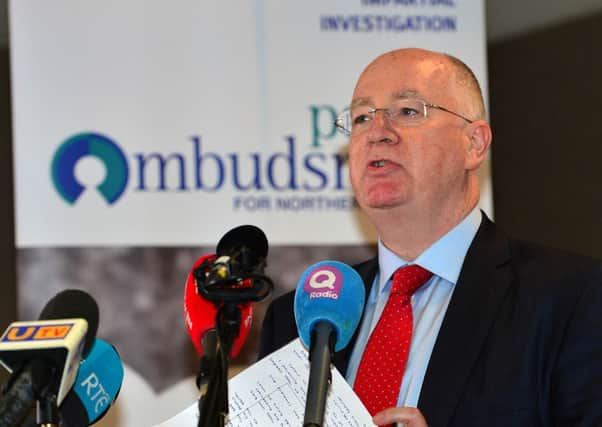Police Ombudsman hits back at criticism of Loughinisland report


My report is 150 pages long, with around 44,000 words. It was ‘fact-checked’ by the PSNI, who have accepted it.
It found police had informants involved in an importation of guns and ammunition into Northern Ireland, including those connected to the Loughinisland shooting.
Advertisement
Hide AdAdvertisement
Hide AdIt found some police officers dealing with terrorism in south Down in the late 1980s and early 1990s seemed to place more value on collecting information and protecting their sources than on preventing and detecting crime.
It found fundamental failings in the investigation of the Loughinisland shootings.
Your contributor last week made a number of inaccurate observations about the report.
His or her main concern was that my report does not understand the context of the time, the difficulty of running informants and their value. This too is not the case.
Advertisement
Hide AdAdvertisement
Hide AdThe report explains that I considered the context within which police were operating.
It acknowledges the value of informants, and that these ‘sources’ saved many lives.
It acknowledges that Special Branch sought guidance from Government in how to use informants, but none was forthcoming.
It acknowledges the good work done by some of the police officers involved – both in Special Branch and in CID.
Advertisement
Hide AdAdvertisement
Hide AdI do not agree with your contributor’s implication that those involved in serious criminal acts should be immune from investigation and possible prosecution, simply to protect their status as informants.
My investigation uncovered intelligence which reported certain individuals were involved in serious criminality.
The fact that these matters were not subject to investigation is indefensible. The existence of the “long game”, as your contributor puts it, does not justify the means.
There has been discussion in the last few day about the different definitions of collusion and how they should be applied. I chose the definition accepted by the PSNI.
Advertisement
Hide AdAdvertisement
Hide AdIt was also the definition used by Justice Smithwick when he ruled there was collusion in connection with the 1989 murders of Chief Superintendent Harry Breen and Superintendent Bob Buchannan.
Given that definition and the facts contained in his report, I could only conclude that collusion was a significant feature of the Loughinisland murders.
Your contributor’s assertion that the Office always comes to such a view is also wrong, as any look at our recent ‘historical reports’ will show. Your contributor also refers to the lack of arrests or charges following our investigation.
In this instance, with the passage of time, weak forensics, some witnesses no longer being available, some documents missing and with some people choosing not to speak to us, it was not always possible to get a detailed picture of the role of certain individuals.
Advertisement
Hide AdAdvertisement
Hide AdThe notion that the absence of arrests or charges means the absence of a possible crime is an interesting one.
If this approach had been taken, would the Hillsborough Panel have been able to conclude its work?
I think this is a broader issue not only for the Police Ombudsman’s Office, but for the police, for the proposed Historical Inquiries Unit (HIU) and for other bodies looking at events from the past.
I agree with your contributor that the way in which we deal with the past in Northern Ireland is fragmented and unequal. I fully support the current proposals to establish mechanisms such as the HIU.
Report criticised by ex-Special Branch officer
Advertisement
Hide AdAdvertisement
Hide AdPolice Ombudsman Dr Michael Maguire’s report into Loughinisland and the events surrounding it had been critical of the use of informers by the security authorities and the failure to fully recover a shipment of loyalist weapons once they had arrived in Northern Ireland, among other things.
Friday’s News Letter carried a double-page response, written by a veteran ex-Special Branch officer. CLICK HERE FOR ARTICLE.
The News Letter knows their identity, but is allowing them to remain anonymous.
They suggested that “very little consideration has been given to the contextual dangers and difficulties faced by the RUC at that time”.
They also wrote that the Ombudsman had failed to consider that “intelligence work is a long game”.